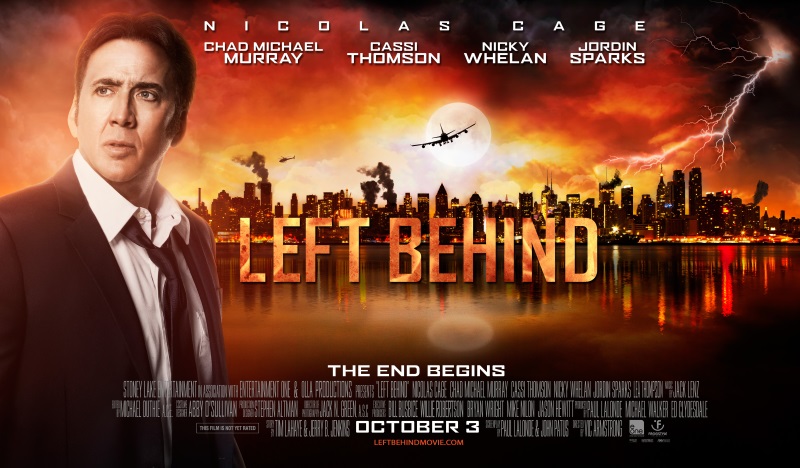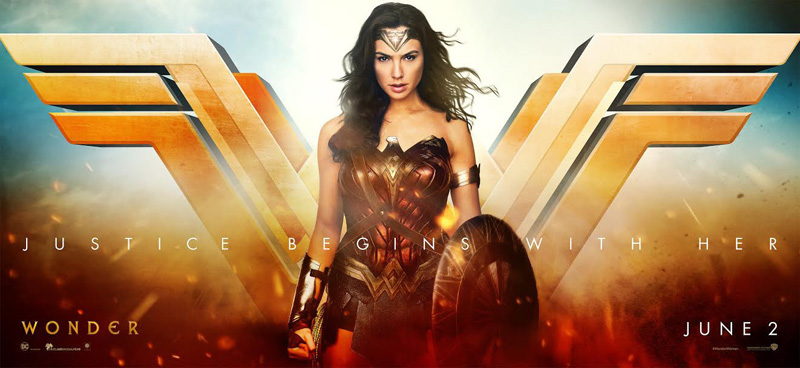IMDB’s description
A small group of survivors are left behind after millions of people suddenly vanish and the world is plunged into chaos and destruction.

The movie opens with Chloe Steele (Cassi Thomson) coming home from college for her birthday. Expecting to spend the weekend with her family, she is surprised to discover her father, Rayford (Nicolas Cage), has to unexpectedly leave to pilot a plane to London. This isn’t a bizarre occurance or anything, he happens to be a pilot as his primary occupation, cheating on his wife is his second one.
Rayford, an unlikable guy who planned this trip to spend a weekend away with a stewardess, says things are fine between him and his wife, but that isn’t true. I guess things really went bad in their marriage when his wife Irene (Lea Thompson) found religion and starting babbling about the Rapture. An event believed by some Christians to signal the second coming of Christ / end of the world. Would you believe that her new views, which are driving a wedge into her family, end up playing a part in the movie? Let’s watch and see.
Chloe confronts her father at the airport about his cheating ways, which he denies, and he departs on his flight. She in turn decides to take her younger brother, Raymie, to the mall after bickering with her crazy mother. While at the mall Raymie suddenly disappears, leaving all of his clothes behind. Chloe is in shock. Sure, her younger brother has played the disappearing act before (that’s what younger brothers do), but never with this level of commitment. As Chloe attempts to get some help, other people in the mall are also having a freak out. Looks like all the children are gone, and also a few adults. A driver-less car crashes into the mall. Chloe catches a special news report that says that people (mostly children) across the world are missing, and that panic has ensued. The smarter patrons of the mall see this opportunity for what it is, and massive looting starts.
Jump back to plane flight to London. It looks like a bunch of people have disappeared as well, including all the children and the co-pilot, leaving behind their clothing. Sidenote: I’m not sure I’m comfortable with a Rapture in which everyone shows up to the party naked. The passengers pretend to be upset about the missing people, but are probably secretly grateful to enjoy a long flight with more seats and no annoying kids.
Rayford can’t seem to raise anyone on the ground, and suddenly realizes there is a plane right in his flight path. I’m not a pilot, but it seems to me that once you realize something is going to collide with you, you’d want to immediately veer out of the way. But alas, I must be mistaken, for Rayford makes repeated requests for the other plane to move. That plane obviously has no pilots left, and between this, the missing co-pilot, and the small plane that crashed in the mall parking lot that I am only mentioning now, we can safely conclude that most pilots are devote Christians. Rayford finally considers turning at the last possible moment, getting his plane damaged in the process. Unable to raise the ground and with a damaged plane, Rayford decides to turn around and head back to New York.
I forgot to mention that when Chloe caught up with her father at the airport, she bumped into some famous reporter and they seemed to hit it off. That guy is on the plane, and wouldn’t you know it, he is also a pilot, or something, because he ends up helping Rayford out quite a bit, including as co-pilot and taking pictures of the leaking fuel that catches on fire.
Back at home Chloe receives a voice mail from her father about his plane’s condition and assumes he is dead. Returning to her house, she also discovers her mother’s jewelry in the shower, but her mother is not to be found. I guess Chloe knows that her mother always showers fully bejeweled, or something. She decides to mosey on over to her mother’s church, only to discover the only one there is Pastor Barnes. Barnes explains that God took all the good people to heaven, including Chloe’s mother, but left him behind to be a messenger. Not really though, he was left behind because he didn’t believe in the product he was selling (his words, not mine).
Despite a damaged plane which is leaking fuel (sometimes on fire) at an alarming rate , Rayford takes the time to investigate the disappearances of people around him. He finds a few Christian items amongst the co-pilot’s, missing stewardess’, and missing passengers’ clothes. His conclusion? They all shopped at the same airport gift shop before leaving for London. Rayford tells the stewardess he was having an affair with about his wife’s statements concerning the rapture and he thinks all the good people have been taken off the Earth. The stewardess is more concerned to learn that Rayford was married than she is to learn she is one of the damned left to suffer the Apocalypse. Priorities, I guess.
Meanwhile, Chloe, seeing New York City going to pot and thinking her whole family is gone, decides to climb the Brooklyn Bridge (or some other bridge) and commit suicide. Just as she is ready to jump she receives a call from that reporter guy. They don’t have anywhere to land and they are dangerously low on fuel. Chloe was, of course, the logical choice to call in this situation. Chloe procures a truck and manages to clear a space for the plane to land. The remaining passengers and crew deplane only to see New York City in flames. The reporter says it looks like the end of the world, but Chloe tells him that it is only the beginning (of the end). Things are looking up for that stewardess though, because Rayford’s wife is out of the picture.
If you look at that IMDB description at the top you’d see a couple of glaring inaccuracies. To me is suggests most of the people were taken off the Earth, but that isn’t what happened. Also, the world isn’t plunged into chaos and destruction until the end of the movie.
This movie is apparently based off a series of books which mostly focus on the aftermath of the Rapture as those “left behind” deal with a crumbling world that apparently no longer has any good people on it.
Like this:
Like Loading...





